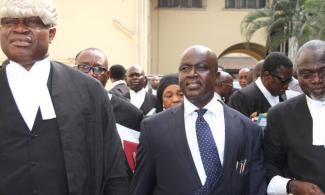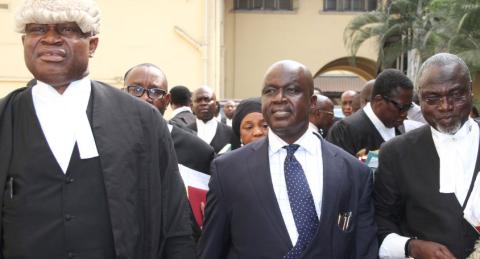
Controversial lawyer, Mr. Rickey Tarfa (SAN), has landed in a fresh scandal following his demand and receipt of a N100 million from a client to bribe a judge handling the client’s case.
Exclusive documents in possession of SaharaReporters, show that the client, Mr. Nsima Ekere, had an interest in a civil/political suit Ime Ekanem Vs PDP (Peoples Democratic Party), Udom Emmanuel; as well as another suit FCT/HC/CV/7652014, which Mr. Tarfa’s firm was prosecuting before Justice Yusuf Halilu of the Federal Capital Territory High Court.
Mr. Tarfa’s firm demanded, as legal fee, the sum of N5 million, which was paid in two equal installments of N2.5million. The first installment was paid in cash to the cashier at Mr. Tarfa’s firm, while the other was paid into Rickey Tarfa and Company’s account domiciled in Zenith Bank.
After the mention and hearing of the suit, Tarfa, documents showed, approached the Ekanem with a request of N100 million.
The client asked if the requested sum was part of the legal fee, but Mr. Tarfa responded in the negative, explaining that it was required to ensure that all the client’s prayers brought before the court were granted.
Tarfa was said to have assured that his effort would be successful, promising a refund of the bribe it failed.
With an agreement secured, Mr. Tarfa instructed Mr. Segun Jolawo and Mrs. Regina Okotie-Eboh, lawyers participating in the case, to provide a distinct account for the lodgment of the N100 million. The account provided bears the name Afuwa Integrated Services and is domiciled with Zenith Bank (1013902385).
Curiously though, Mr. Tarfa abandoned the suit leading to the court striking it out. Worse still, he failed to make a refund of the received sum, as promised, if the court declined the client’s prayers. Attempts to get him to comply were futile, with Tarfa claiming that the money was used to bribe Justice Yusuf Halilu of the Federal Capital Territory High Court.
On account of this, Mr. Ekere instructed his lawyers, Leo Ekpeyong & Co., to demand a refund from Mr. Tarfa. In a letter of demand to Mr. Tarfa’s firm, dated October 19, 2015 and signed by Leo Ekpeyong, Principal Partner, Mr. Tarfa was given seven days to make a refund.
“At this juncture, we hereby demand within seven days the refund of our client’s N100million as same was not given for the purpose of bribing any judge. Our client is a practising born-again Christian, whose belief system is certainly repugnant to such satanic and ungodly practices of bribery and corruption,” wrote the Mr. Ekere’s lawyers.
The legal firm also asked Mr. Tarfa if it was his practice to bribe judges to win cases and if he actually bribed Justice Halilu.
“Maybe the National Judicial Council, the Privileges Committee of the Nigerian Bar Association, the Economic and Financial Crimes Commission, the Nigeria Police, the Directorate of State Security and indeed, the whole world will hear how our learned silk has indeed been practising law vis-à-vis his relationship with his clients, just in seven days. I repeat, in seven days,” threatened Ekere’s lawyers.
Mr. Tarfa would later comply with the demand, but not fully. This nudged Mr. Ekere’s solicitors towards the Economic and Financial Crimes Commission (EFCC). In a letter to the acting EFCC Chairman, Mr. Ibrahim Magu, Mr. Ekere’s solicitors said Tarfa refunded the sum of N70 million, an uncomplicated indication that he actually received N100 million from their client.
Titled “The Unholy Exchange Between Justice Yusuf Halilu and Rickey Tarfa (SAN) and dated 18 July, 2016, the letter said Mr. Tarfa has refused to pay the balance of N30 million to Ekere and requested the EFCC to investigate the relationship between Mr. Tarfa and Justice Halilu as well as the bank account that served as conduit for the bribe. Mr. Tarfa knows a thing or two about bribing judges. Earlier this year, the lawyer was arraigned before a Lagos State High Court by the EFCC for paying money into the bank accounts of two Federal High Court judges. EFCC’s witness in the trial, Tosin Owobo, told the court that the anti-graft commission wrote letters to Zenith Bank and Fidelity Bank in the course of its investigation to request information on Tarfa and Awa Ajia Nigeria Limited’s account. Replies from the two banks showed that the signatory to the company’s account was Justice Hyeladzira Nganjiwa.
Also found in the transaction history was Justice Mohammed Nasir Yunusa of the Federal High Court. Owobo provided detailed information of transactions emanating from Mr. Tarfa to the two judges from the statement of account received. Further hearing on the case will commence on 13 and 14 October.
